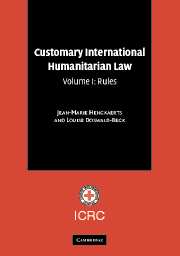Book contents
- Frontmatter
- Contents
- Foreword by ICRC President Jakob Kellenberger
- Foreword by Judge Abdul G. Koroma
- Foreword by Yves Sandoz
- Acknowledgements
- Introduction
- List of abbreviations
- Part I The Principle of Distinction
- Part II Specifically Protected Persons and Objects
- Part III Specific Methods of Warfare
- Chapter 15 Denial of Quarter (Rules 46–48)
- Chapter 16 Destruction and Seizure of Property (Rules 49–52)
- Chapter 17 Starvation and Access to Humanitarian Relief (Rules 53–56)
- Chapter 18 Deception (Rules 57–65)
- Chapter 19 Communication with the Enemy (Rules 66–69)
- Part IV Weapons
- Part V Treatment of Civilians and Persons Hors De Combat
- Part VI Implementation
Chapter 15 - Denial of Quarter (Rules 46–48)
Published online by Cambridge University Press: 05 June 2012
- Frontmatter
- Contents
- Foreword by ICRC President Jakob Kellenberger
- Foreword by Judge Abdul G. Koroma
- Foreword by Yves Sandoz
- Acknowledgements
- Introduction
- List of abbreviations
- Part I The Principle of Distinction
- Part II Specifically Protected Persons and Objects
- Part III Specific Methods of Warfare
- Chapter 15 Denial of Quarter (Rules 46–48)
- Chapter 16 Destruction and Seizure of Property (Rules 49–52)
- Chapter 17 Starvation and Access to Humanitarian Relief (Rules 53–56)
- Chapter 18 Deception (Rules 57–65)
- Chapter 19 Communication with the Enemy (Rules 66–69)
- Part IV Weapons
- Part V Treatment of Civilians and Persons Hors De Combat
- Part VI Implementation
Summary
Note: The duty to grant quarter is a basic rule that prohibits attacking a person recognised as hors de combat in combat situations on the battlefield. The treatment due to persons hors de combat is dealt with in Part V.
Rule 46. Ordering that no quarter will be given, threatening an adversary therewith or conducting hostilities on this basis is prohibited.
Practice
Volume II, Chapter 15, Section A.
Summary
State practice establishes this rule as a norm of customary international law applicable in both international and non-international armed conflicts. While all those who take a direct part in hostilities must respect this rule, in practice it will be particularly relevant for commanders.
International armed conflicts
The prohibition on declaring that no quarter will be given is a long-standing rule of customary international law already recognised in the Lieber Code, the Brussels Declaration and the Oxford Manual and codified in the Hague Regulations. “Directions to give no quarter” was listed as a war crime in the Report of the Commission on Responsibility set up after the First World War. This rule is now set forth in Additional Protocol I. Under the Statute of the International Criminal Court, “declaring that no quarter will be given” is a war crime in international armed conflicts.
The prohibition is contained in numerous military manuals. Under the legislation of many States, it is an offence to issue an order that no quarter be given.
- Type
- Chapter
- Information
- Customary International Humanitarian Law , pp. 161 - 172Publisher: Cambridge University PressPrint publication year: 2005



